The greatest prize in world football is that of the golden World Cup trophy.

But for those less fortunate, the Golden Boot is the next best gong a player can scoop at a World Cup and, ideally, they go hand in hand.
None of the first six World Cups saw the Golden Boot winner also land on the side that won that tournament, with Argentina's Guillermo Stábile losing in the final before he scooped the award.
The World Cup is always littered with the best players on the planet and heading to Qatar will be no different.
Neymar, of Brazil, Lionel Messi, of Argentina, and Harry Kane, the last World Cup Golden Boot winner when England reached the semi-finals four years ago, will all be eager to land the coveted prize.
Sportsmail runs through every World Cup Golden Boot winner since the tournament began in Uruguay back in 1930...

1930 - Uruguay
Top scorer: Guillermo Stábile (Argentina)
Goals: 8
Games: 4
Having sat out Argentina's opening match against France, Stábile would have been forgiven for expecting himself something of a quiet tournament.
The-then Huracan striker got his chance in the second match against Mexico as first-choice striker Roberto Cherro was suffering from anxiety.
Stábile, then 25, took his chance in a match that finished 6-3 to Argentina.
He bagged a hat-trick in that game before going on to add two more in the final group game against Chile.
A 6-1 semi-final win against the United States saw him bag a brace to take his tally to seven, before he added one more goal in a 4-2 loss to Uruguay in the final.
For a national team debutant, it was a splendid introduction and earned him a move to Italy with Genoa as a direct result.
1934 - Italy
Top scorer: Oldřich Nejedlý (Czechslovakia)
Goals: 5
Games: 4
Another non-winner getting their hands on the Golden Boot but Nejedlý is rightly regarded as one of Czechslovakia's greatest ever players - and not just for his exploits in 1934.
His goal against Romania in the preliminary round helped seal a comeback win before he netted the winning goal in the quarter-final against Switzerland with the game finely poised at 2-2 after 81 minutes.
Nejedlý saved his best performance for the semi-final when he hit a stupendous hat-trick to blow West Germany away.
Manager Karel Petru couldn't get a tune out of his striker in the final as they lost 2-1 in extra-time to Italy.
The biggest tragedy with Nejedlý is that he broke his leg at the World Cup four years later and that all but closed the book on his international career. Robbed of many more goals - but top scorer with five in 1934.
1938 - France
Top scorer: Leônidas (Brazil)
Goals: 7
Games: 5
Brazil majorly underperformed four years prior in Italy and were returning to Europe armed with even better talent to go for the crown.
In the opening match Brazil played their part in one of the greatest World Cup matches ever as they navigated the mud and the rain to defeat Poland 6-5, with Leonidas bagging a hat-trick.
Next up was Czechslovakia, in a match later made famous as the 'Battle of Bordeaux' due to the ferocity of it and the number of injuries that were suffered.
Leonidas gave Brazil the lead before Nejedlý levelled.
With no penalties to split the sides, they played a second match and Leonidas scored again, this time in a 2-1 win.
He'd add two more in a 4-2 third-placed play-off against Sweden to cap off a fine tournament, in which he was claimed to have invented the 'bicycle' kick.
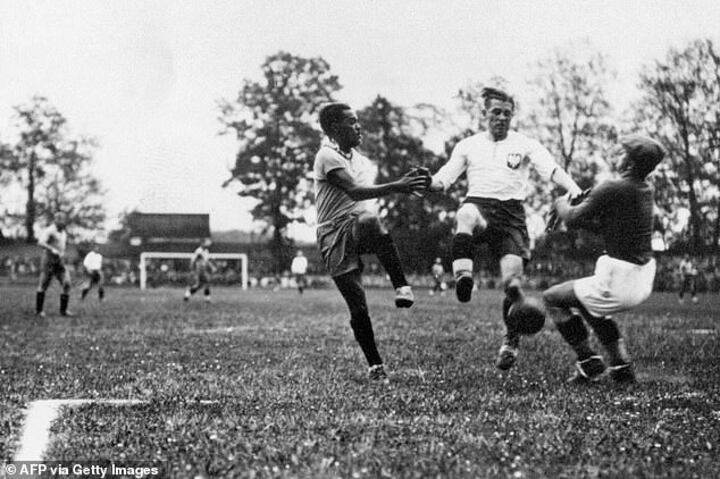
1950 - Brazil
Top scorer: Ademir (Brazil)
Goals: 9
Games: 6
Put simply, Ademir, or in full, Ademir de Menezes, is viewed as one of the finest strikers in football history.
As hosts, Brazil got the tournament underway with a 4-0 win against Mexico, with Ademir bookending the goals.
While he failed to find the net in a 2-2 draw against Switzerland, he bagged his third goal of the tournament against Yugoslavia at the Maracana in their third match, which ensured Brazil finished second in their group behind Uruguay.
Brazil took it up a level, Ademir in particular, when the knockout stages rolled round.
They hit Sweden for seven - Ademir bagged four in the 7-1 win - before Spain were hit for six, with Ademir scoring another two in a 6-1 rout.
That set up a mouthwatering final with Uruguay, only for Brazil, and Ademir, to fall short on the day, much to the Selecao's disappointment.
1954 - Switzerland
Top scorer: Sándor Kocsis (Hungary)
Goals: 11
Games: 5
This was a tournament of goals, goals and more goals.
In total, 140 goals were scored by 63 players; four were credited as own goals.
But 11 came from Hungarian superstar Sándor Kocsis and that was enough across five games to crown him the Golden Boot winner.
Kocsis, the then-Honved striker but one-time Barcelona attacker, was dynamite all tournament in a team that was the envy of the rest of Europe.
He started in relentless fashion, bagging a hat-trick in a 9-0 win over South Korea.
Kocsis just seemed to get better and better, though, and four more goals followed in the second match, this time against Germany in what finished up as an 8-3 win.
The quarter-final brought on the 'Battle of the Berne' - a now famed match where Hungary navigated the star names of Brazil.
Kocsis bagged a brace with his hot goalscoring form showing no signs of slowing down. He was integral to their 4-2 win over the South Americans.
A nip-and-tuck semi-final against Uruguay, which was forced into extra-time with the score at 2-2, was settled by two goals from Kocsis, setting up a final with Germany, in which Hungary lost, with Kocsis failing to score for the first time all tournament.

1958 - Sweden
Top scorer: Just Fontaine (France)
Goals: 13
Games: 6
Still to this day a history-maker.
What Just Fontaine achieved in 1958 has never been matched - or topped. No player in World Cup history has ever scored more goals in a single finals than the Frenchman.
His 13 goals in six games remains absolutely remarkable.
Albert Batteaux's side were rampant in front of goal, which helped, and Fontaine feasted with a hat-trick in the first game, a 7-3 win over Paraguay, who actually took the lead before Fontaine started running the show.
From there he scored both in their 3-2 defeat to Yugoslavia in the second game before scoring France's second in their 2-1 win over Scotland on matchday three.
Two more followed in a 4-0 quarter-final win over Northern Ireland before he grabbed one of France's consolation goals in their humbling 5-2 semi-final defeat to Brazil.
At least Fontaine and France ended on a high, shellacking Germany 6-3 to win the third-placed play-off, with Fontaine bagging four, putting him seven goals clear of Germany's Helmut Rahn, his nearest Golden Boot challenger.
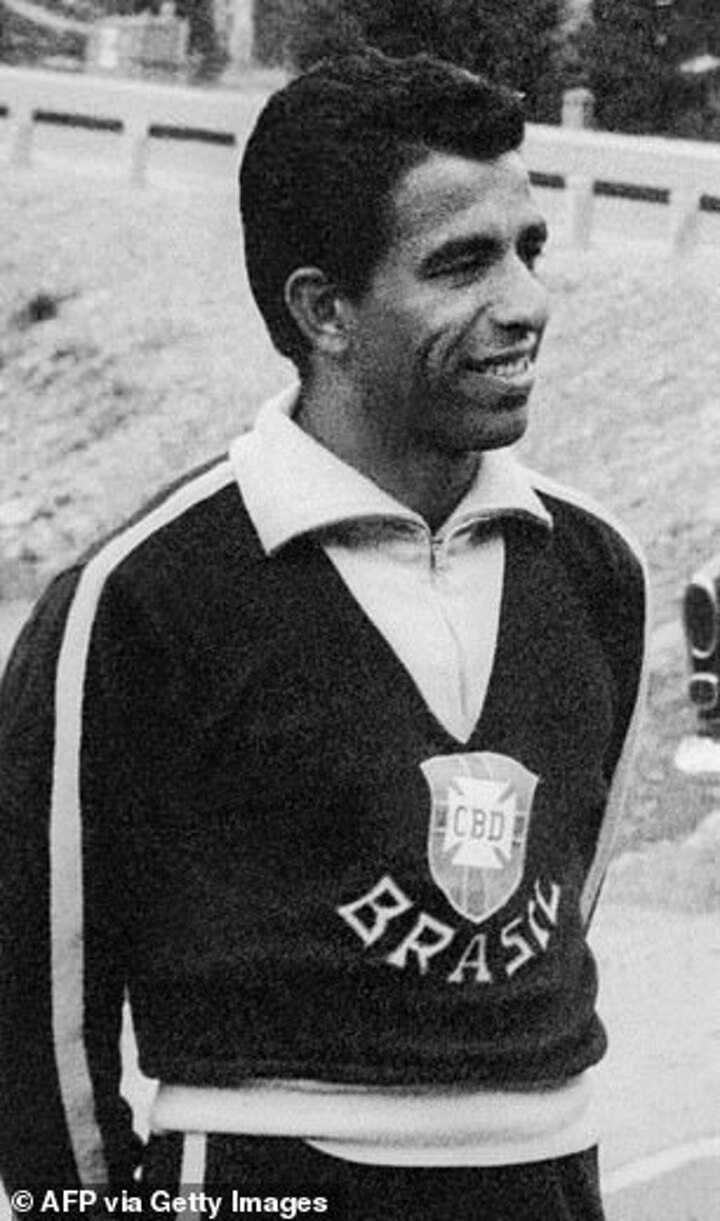
1962 - Chile
Top scorer: Garrincha (Brazil), Vava (Brazil), Leonel Sanchez (Chile), Florian Albert (Hungary), Valentin Ivanov (Soviet Union), Dražan Jerković (Yugoslavia)
Goals: 4
Games: 6 (Albert/Ivanov only played four matches)
Here we have the first time the top scorer award was shared between players.
Unlike the majestic scoring of Fontaine four years earlier, Chile was more of an advert for sharing them around as six players topped the standings with four when the tournament wrapped.
Six players – Hungary's Florian Albert, Soviet Union's Valentin Ivanov, Brazil's Garrincha and Vava, Yugoslavia's Drazan Jerkovic and the host nation's Leonel Sanchez – finished as joint top-scorers.
It is worth pointing out that Albert and Ivanov finished with four goals in four games, compared to the rest playing six.
Given they went on to win it, special mention to Garrincha and Vava, both of whom finished among the six top scorers.
Neither of them netted across three group games but they came alive in the quarter-finals against England, with Garrincha bagging a brace and Vava scoring the other.
They both then scored a brace each in a 4-2 semi-final win over hosts Chile before Vava got one of their three goals in the final to seal World Cup glory against a formidable Czechslovakia.
1966 - England
Top scorer: Eusébio (Portugal)
Goals: 9
Games: 6
Fond memories for any fans of the Three Lions. But for as good as Sir Alf Ramsey's side were in winning it, they didn't end up boasting the tournament's top scorer.
That honour went to Portugal and, more specifically, to Eusebio.
Portugal found themselves in Group 3 alongside Bulgaria, Brazil and Hungary but navigated it with ease, winning all three group games.
Eusebio scored once in a 3-0 win against Bulgaria, having blanked in the win over Hungary. He saved a two-goal, man-of-the-match display for the final group game in which Pele's Brazil were outclassed in a 3-1 win.
From there, with three goals already to his name and confidence coursing through his veins, Eusebio produced a performance for the ages with four goals in their 5-3 quarter-final win over North Korea.
He bagged a consolation in a 2-1 semi-final loss to eventual winners England before adding his ninth of the tournament in a 2-1 third-placed play-off win over the Soviet Union.
Still, those displays against Brazil and North Korea were other worldly. What a player.

1970 - Mexico
Top scorer: Gerd Müller (West Germany)
Goals: 10
Games: 6
Evoking memories of the Azteca, Mexico 1970 remains a favourite World Cup of many.
This was a joy to behold seeing Brazil, eventual winners, dance their way around opponents playing some of the best football fans had seen up to that point - and to some, even to this day.
But it was not Pele who finished top scorer, that would be West Germany's Gerd Muller, who finished on 10 goals from six matches.
Muller bagged the winner in their opening group game against Morocco, before scoring a hat-trick in their 5-2 win over Bulgaria.
Another hat-trick followed in Game Three against Peru and at this point, Muller was unstoppable. Three games, seven goals.
West Germany got revenge on England for losing the final four years earlier and it was Muller in extra time who won it, cancelling out goals from Alan Mullery and Martin Peters.
His final goals of the tournament came with a brace against Italy in their extra-time semi-final defeat. A majestic tournament from one of the game's greatest.
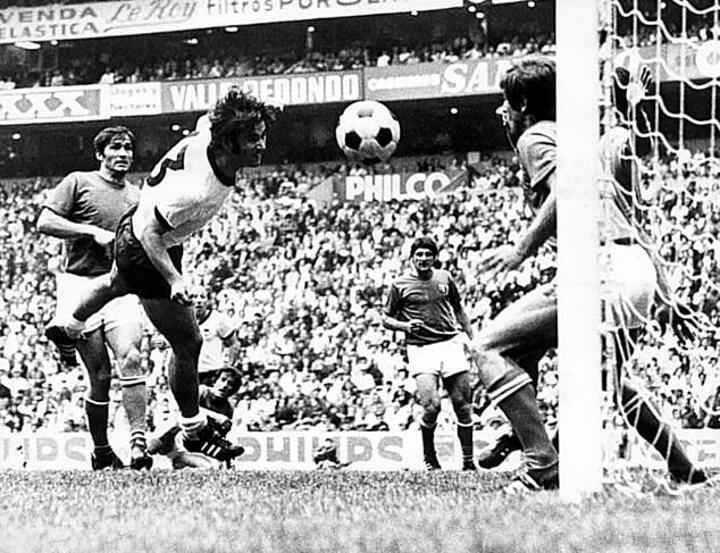
1974 - West Germany
Top scorer: Grzegorz Lato (Poland)
Goals: 7
Games: 7
This was undoubtedly the pinnacle of Grzegorz Lato's career, especially for the national team.
He was roaring on the wing and hit a match-winning brace in their opening 3-2 group win over Argentina.
Things got easier in the second game, a 7-0 demolition of Haiti in which he bagged a further two goals.
Through to the second round they went, following a 2-1 win over Italy in which he didn't score, and Lato was back in his groove with winning goals against Sweden (1-0) and Yugoslavia (2-1) to take him to six goals and counting.
Defeat to West Germany cost them a place in the final but Lato secured his seventh goal in the third-placed play-off against Brazil, in a match that finished 1-0.
1978 - Argentina
Top scorer: Mario Kempes (Argentina)
Goals: 6
Games: 7
It speaks volumes of Kempes that in 2004 he was named by Pele as one of the top 125 greatest players still living.
Kempes went to three World Cups with Argentina but on home soil in 1978 he came alive, finishing as top scorer en route to winning it all.
It was something of a slow burn of a tournament for Kempes, who failed to score in any of Argentina's opening three matches.
When game four came round against Poland, he stepped up with a match-winning brace in a 2-0 win. But, ironically, that game is most remembered for what he did at the other end when he deliberately stopped a ball on the line with his hand. The resulting penalty was saved and Kempes remained the hero, not the villain.
A 0-0 with Brazil followed in the second round group stage before he hit another brace in the 6-0 shellacking of Peru.
That set up a final with Holland and, as he had done the game prior, Kempes pulled off another impressive brace in a 3-1 win in extra-time to lift the trophy.

1982 - Spain
Top scorer: Paolo Rossi (Italy)
Goals: 6
Games: 7
Something of a mixed bag in 1982 for Rossi.
Three abysmal group games - in which he failed to score in any - saw him slammed in the press as a 'ghost aimlessly wandering over the field'. His physique was also being brought into question.
Then came two crucial second round group stage match-ups against holders Argentina and tournament favourites Brazil.
Marco Tardelli and Antonio Cabrini did the damage against Argentina but it was Rossi who produced a historically great performance with a hat-trick to down Brazil.
Defeating Diego Maradona's Argentina and Socrates' Brazil meant a semi-final against Poland and Rossi was again influential, hitting a brace in a 2-0 win.
Then came the final at the Santiago Bernabeu stadium and Rossi netted the first of three Italy goals to win the World Cup and down West Germany 3-1.
Despite his slow start he was named in the Team of the Tournament, while winning the Golden Boot and Golden Ball, for the best player of the tournament.
1986 - Mexico
Top scorer: Gary Lineker (England)
Goals: 6
Games: 5
History maker Gary Lineker became the first Englishman to win the World Cup Golden Boot in 1986.
This was a tournament best remembered for the majesty of Maradona and his victorious Argentina side but we must not play down the performances of Lineker.
Lineker's goals came in the form of a hat-trick against Poland - then the second quickest ever at a World Cup - before a brace against Paraguay in round two.
From there he added a sixth goal in a quarter-final defeat to Maradona and Co, a match which saw the Argentine score his infamous 'Hand of God' goal.
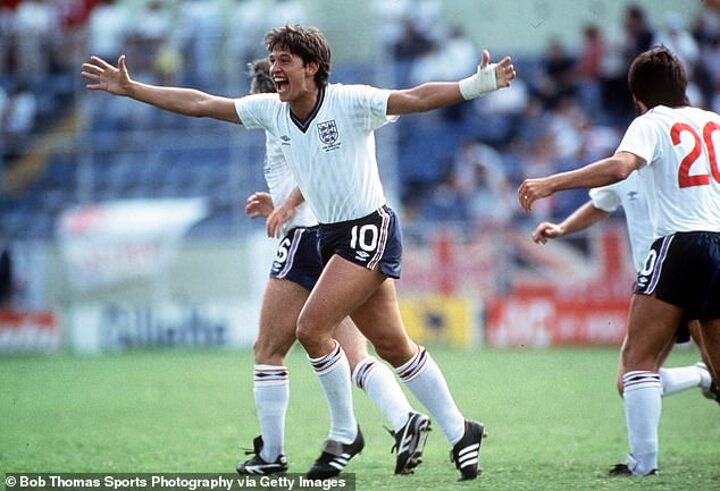
1990 - Italy
Top scorer: Salvatore Schillaci (Italy)
Goals: 6
Games: 7
Italia '90, a tournament that stirs up plenty of nostalgia among football fans.
The then-Juventus attacker Salvatore Schillaci finished top of the scoring charts despite Italy's third-placed finish overall.
Schillaci actually started on the bench for the tournament opener against Austria.
He came on eventually in place of Andrea Carnevale and he made the decisive impact, scoring the only goal in a 1-0 win.
Again he would start from the bench against the USA but calls grew louder to put him in as a starter and he was partnered by Roberto Baggio for the third match against Czechslovakia, in which both strikers scored in a 2-0 win.
The pair's fruitful partnership continued for the next two games - against Uruguay and Republic of Ireland - and Schillaci scored in both to help set up a semi-final against a formidable Argentina side.
It was a deeply dramatic match in which Baggio was pulled from the line-up, Schillaci scored but the match finished 1–1, before Italy lost the penalty shoot-out.
Schillaci capped off his tournament by netting the winning goal in Italy's 2–1 win over England in the third-placed play-off.
1994 - USA
Top scorer: Hristo Stoichkov (Bulgaria), Oleg Salenko (Russia)
Goals: 6
Games: 7 (Salenko only played three games)
A change in the way the top scorer award would work from 1994.
Previously players could share the award - as we saw in Chile in 1962 - but in America a tie-breaker system was brought in by FIFA to pick out a definitive winner.
And yet, hilariously, the award was still shared in 1994 despite the new tie-breaker.
The rules stated that if two players were level on the same number of goals, the determining factor would be the most non-penalty goals and, if still tied, the most assists would win.
But Bulgarian superstar Hristo Stoichkov and Russia's Oleg Salenko both finished with six goals and one assist.
Remarkably, Salenko only played three games as Russia were booted out in the group stage. To this day he remains the only Golden Boot winner in World Cup history to go out in the group and win the award.
It helped his case that five of his six tournament goals came in one fell swoop against Cameroon, in a match that finished 6-1 to Russia.
Stoichkov's Bulgaria made it all the way to the semi-finals before they were turned over 2-1 by Italy.
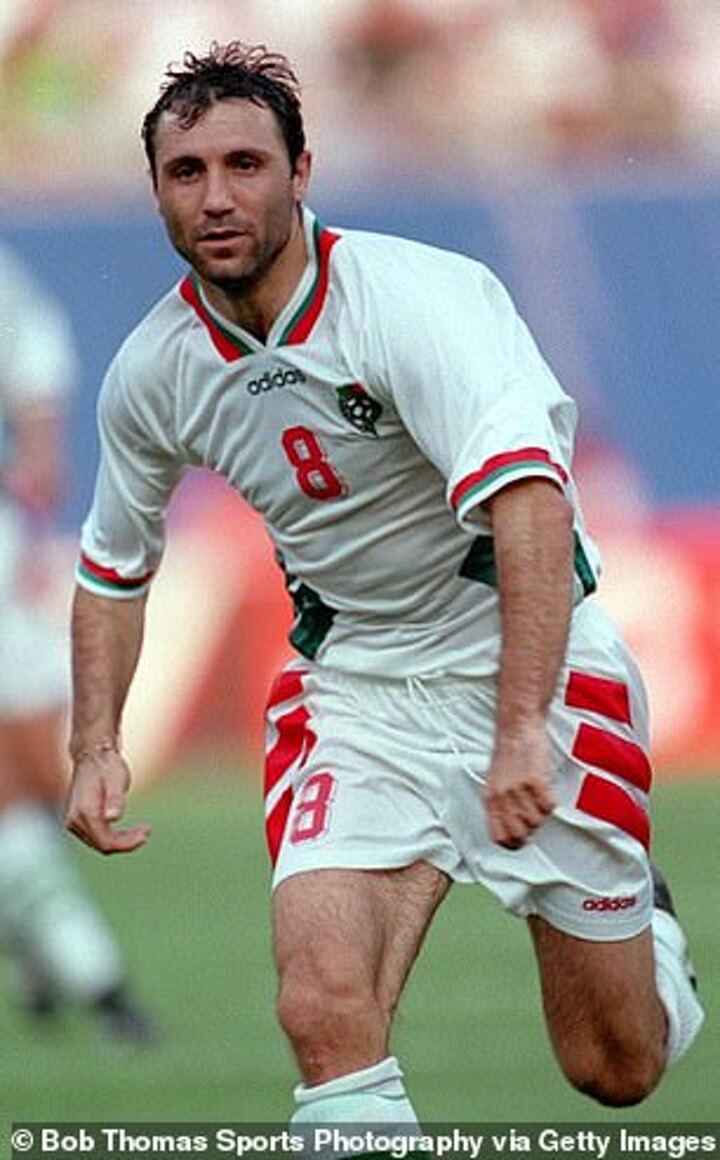
1998 - France
Top scorer: Davor Šuker (Croatia)
Goals: 6
Games: 7
Brazi's Ronaldo may have won Player of the Tournament, and Michael Owen may have scooped the Young Player prize, but it was Croatia's Davor Suker who won the Golden Boot with six goals from seven games.
The then-Real Madrid striker had been integral in helping Croatia qualify for their first World Cup and he stepped up and delivered at the tournament itself.
In every match Croatia scored in, Suker was on the scoresheet. He was central to everything good they did in front of goal.
He netted the winner in a 1-0 group stage win over Japan and got the final goal in a 3-1 win over Jamaica.
The knockout stages followed and it was his goal that made the difference in a 1-0 last-16 win against Romania.
From there a quarter-final with Germany was expected to stop Croatia in their tracks, only for Suker to cap off a fine 3-0 win against a 10-man rival.
It was Suker who gave Croatia the lead in their semi-final against eventual winners France, but the lead lasted no more than a minute when Lilian Thuram netted the first of his two goals.
As has proven typical among the Golden Boot winners, Suker did not tail off in the third-placed play-off as he bagged the winning goal against Holland in a 2-1 win.
2002 - South Korea/Japan
Top scorer: Ronaldo (Brazil)
Goals: 8
Games: 7
Best player four years earlier, Ronaldo added the Golden Boot to his collection, as well as the World Cup trophy, with a brilliant stint in Asia.
Goals against Turkey and China were followed up by a brace in the final group game - a 5-2 rout of Costa Rica.
From there he scored the second goal in a 2-0 last-16 win over Belgium and the match-winning goal in their 1-0 semi-final squeeze past Turkey, setting up a final against Germany, who finished with Oliver Kahn as the Player of the Tournament.
In one of the great World Cup displays, Ronaldo toyed with the German defence and scored both goals in Yokohama to win Brazil the World Cup.
It was a remarkable moment for Brazil and Ronaldo, not least because he was able to avenge the lost final four years prior when he had suffered a seizure before the match.
Critics... take that.

2006 - Germany
Top scorer: Miroslav Klose (Germany)
Goals: 5
Games: 7
The record holder for most goals at World Cups, it was inevitable that Miroslav Klose would end up on this list.
The lethal German striker only needed five goals from seven games in his home tournament to take the 2006 gong, too.
After making a change in 1994, FIFA introduced another layer to the Golden Boot tie-break in 2006 with the player who played the lesser number of minutes considered the winner if players were tied on non-penalty goals and assists.
It didn't end up mattering as Klose's nearest challenger was David Villa, who got three goals for Spain.
Klose scored two in the opening 4-2 win over Costa Rica before grabbing a second group-stage brace against Ecuador in Germany's final group game.
His fifth and final goal came against Argentina in the quarter-finals.
Germany would go on to lose 2-0 to Italy in the semi-finals.

2010 - South Africa
Top scorer: Thomas Müller (Germany)
Goals: 5
Games: 7
Another World Cup and another German Golden Boot winner.
This one did need separation via a tie-break, though.
Thomas Muller went on to win it but he had to fend off competition from Spain’s David Villa, Holland’s Wesley Sneijder and Uruguay’s Diego Forlan.
Each of them finished with five goals but it was Muller who got his hands on the Golden Boot as he added three assists to his tally. The other three only had one.
Villa came second by virtue of the new minutes played tie-break, edging out Sneijder.
2014 - Brazil
Top scorer: James Rodriguez (Colombia)
Goals: 6
Games: 5
A breakout tournament for a breakout star.
James Rodriguez, then just 23, scored at least once in all five of Colombia's matches in Brazil. A model of consistency.
Beaten by Brazil in the quarter-finals, Rodriguez wrapped up his tournament with six goals and two assists, edging out Muller and Lionel Messi to the Golden Boot.
It was a tournament which provided a springboard for Rodriguez to go on and play for Real Madrid.
And his spectacular goal against Uruguay in the last-16, opening the scoring in that match, will go down as one of the greatest finishes in World Cup history.
2018 - Russia
Top scorer: Harry Kane (England)
Goals: 6
Games: 6
First Lineker, now Harry Kane.
Despite England's disappointment at losing in the semi-finals to Croatia, this was a tournament to remember for the Tottenham striker.
Kane's six goals put him two clear of Antoine Griezmann, who won the tournament with France.
The England captain scored a match-winning brace to beat Tunisia 2-1 - the second goal came in stoppage time - in the opening group game before netting a hat-trick in the 6-1 rout of Panama in game two.
Kane sat out the third group game - a 1-0 loss to Belgium - before scoring England's only goal in their last-16 1-1 draw with Colombia, which the Three Lions won on penalties.
He failed to score in the quarter-final win over Sweden and the 2-1 semi-final defeat to Croatia and England would go on to lose the third-placed play-off 2-0 to group rivals Belgium.

